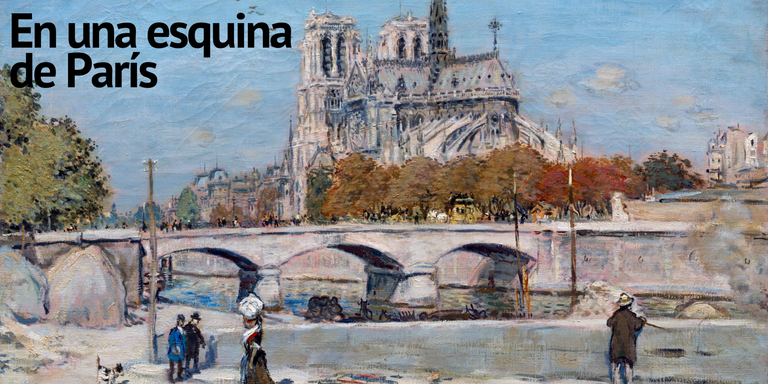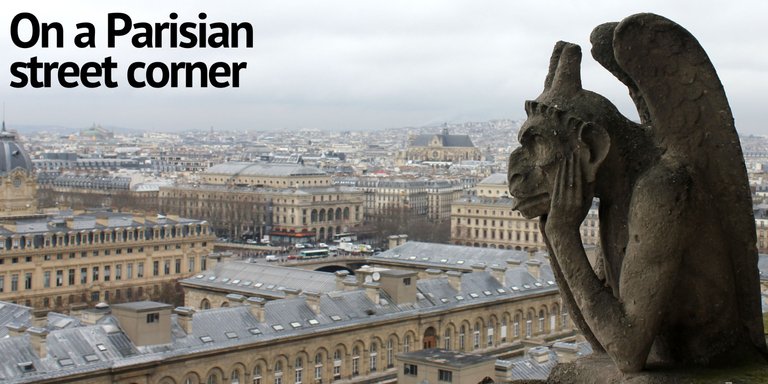La escritura entre el amor y las letras / En una esquina de París [Esp. Eng.]

En una esquina de París
Por las calles empedradas de la ciudad del París de 1900, dos acontecimientos se cruzaron como suelen cruzarse los destinos de las más elevadas sencilleces de la vida. La primera, corrijo, una de ellas, porque ninguna era más hermosa que la otra, se trataba de Madeleine; la joven rubia de cabellos libres y alborotados, que no era lo único que adornaban su cabeza, porque aparte de ser encantadoramente sensible, Madeleine tenía una debilidad terrible por los libros e invertía tiempo en leer; no para que su cabello se sintiera cómodo al lado de las historias que la joven introducía en su memoria, sino porque ella, como era pobre sabía que los libros eran máquinas del tiempo y al abrirlos podía viajar con ellos hacia mundos de ensueños.
Cuando Madeleine no leía, paseaba; y esa mañana, cuando se cruzó con la otra sencillez de la vida, llevaba bajo el brazo un ejemplar de "Veinte mil leguas de viaje submarino", de Julio Verne. Quizás fue esa la razón de que, al ser sorprendida por el sol parisiense en aquella esquina, no pudo cubrirse la cara, para no dejar caer el ejemplar, y fue iluminada de frente por los rayos del sol quien tomó posesión de su rostro, delineó la comisura de sus labios y encendió la chispa de sus ojos; y todo, justo cuando el ferrocarril pasaba como un inmenso ciempiés milenario y el joven Etienne, conductor de la máquina, casi se descarrila y acaba con la vida de los pasajeros.
Madeleine y el sol se cruzaron esa mañana como dos actos sencillos de belleza, y no solo encendieron aquella esquina de París, fue mayor lo que hicieron; alumbraron la inhóspita soledad de Etienne, porque cuando el joven miró a la joven, se sintió cegado por su belleza y eso bastó para perder el control; a Dios gracias, todo fue un susto para los pasajeros y una amonestación para el chico, que a partir de entonces, aunque cargara los ojos más abiertos que dos pepas de sol, se creía ciego de amor, la buscaba en las próximas esquinas, la soñaba en los siguientes viajes, pero Madeleine había desaparecido después de haberle enderezado sus candiles, según él.
Semana después el ferrocarril perdió a Etienne; confesó su enfermedad, estaba muriendo de amor y si no encontraba a la chica, su vida no tendría sentido por más que anduviera a toda velocidad en la más moderna de las máquinas viajeras. Necesitaba hallarla y empezó a preguntar hasta que alguien le dijo que la chica siempre cargaba un libro bajo el brazo, que fuera a la biblioteca pública; y por más que duró rondando el reciento, la joven nunca apareció.
Pero Etienne no perdió la fe; por las noches recorría los cafés, por las tardes recorría las calles y por la mañana regresaba a la biblioteca; y mientras la esperaba, se le ocurrió iniciarse en la lectura y quitó prestado Cinco semanas en globo, la novela de Julio Verne.
Cuando salió de la biblioteca regresó a las calles, pero esta vez descubrió la arquitectura de los boulevards, los cafés, los cabarés; entró a los talleres y galerías de arte, le llamó la atención las salas de conciertos, y a punto estuvo de entrar por primera vez a la catedral de Notre-Dame; no lo hizo porque dos acontecimientos se volvieron a cruzar como suelen cruzarse las más elevadas sencilleces de la vida para cambiar los destinos de las almas que se encuentran por segunda vez.
La primera, y esta vez sí ocurrió en este orden, fue la presencia de Madeleine que salió de la iglesia y se encontró con Etienne, quien entraba; reconocerse fue la segunda. Ella supo que el joven era el culpable del susto de los pasajeros; él sabía que ella era la culpable de que la muerte lo pasara recogiendo pronto; ninguno se reclamó y cuando ambos vieron que cargaban lo mismo debajo del brazo, y que eran libros del mismo autor; ella supo que él era el joven que la había mirado el día del accidente y por eso casi se estrella; él vio que ella no necesitaba que el sol le encendiera los ojos porque la joven era hermosa, aunque no la alumbraran las constelaciones.
El mes siguiente entraron juntos a la catedral de Notre-Dame; ella iba vestida de blanco y él, atractivo, con su nuevo uniforme azul porque también había recuperado su trabajo como conductor del ferrocarril. Se supo que se convirtieron en una pareja de aventureros y amantes del conocimiento, inspirados por las historias de Julio Verne.

On a Parisian street corner
On the cobblestone streets of the city of Paris in 1900, two events crossed paths as the destinies of the highest simplicities of life usually do. The first, I correct, one of them, because neither was more beautiful than the other, it was about Madeleine; the young blonde with free and tousled hair, which was not the only thing that adorned her head, because apart from being charmingly sensitive, Madeleine had a terrible weakness for books and invested time in reading; not so that her hair would feel comfortable next to the stories that the young girl introduced into her memory, but because she, being poor, knew that books were time machines and when she opened them she could travel with them to dream worlds.
When Madeleine was not reading, she was walking; and that morning, when she came across the other simplicity of life, she was carrying under her arm a copy of "Twenty Thousand Leagues Under the Sea" by Jules Verne. Perhaps that was the reason why, when she was surprised by the Parisian sun on that corner, she could not cover her face, so as not to drop the copy, and was illuminated from the front by the rays of the sun that took possession of her face, outlined the corners of her lips and lit the spark in her eyes; and all, just when the railroad was passing like an immense millennial centipede and the young Etienne, driver of the engine, almost derailed and ended the lives of the passengers.
Madeleine and the sun crossed paths that morning like two simple acts of beauty, and not only did they illuminate that corner of Paris, they did more than that; they illuminated Etienne's inhospitable solitude, because when the young man looked at the young woman, he was blinded by her beauty and that was enough to lose control; Thank God, it was all a fright for the passengers and an admonition for the boy, who from then on, although his eyes were wider than two pepas de sol, thought himself blind with love, looked for her on the following corners, dreamed of her on the following trips, but Madeleine had disappeared after having straightened his sails, according to him.
A week later the railroad lost Etienne; he confessed his illness, he was dying of love and if he did not find the girl, his life would have no meaning no matter how fast he rode at full speed on the most modern of the traveling machines. He needed to find her and began to ask around until someone told him that the girl always carried a book under her arm, to go to the public library; and no matter how long he hovered around the library, the young woman never appeared.
But Etienne did not lose faith; in the evenings he went through the cafés, in the afternoons he walked the streets and in the mornings he returned to the library; and while waiting for her, it occurred to him to start reading and he borrowed Five Weeks in a Balloon, the novel by Jules Verne.
When he left the library he returned to the streets, but this time he discovered the architecture of the boulevards, the cafés, the cabarets; he entered the workshops and art galleries, the concert halls caught his attention, and he was about to enter the cathedral of Notre-Dame for the first time; he did not do so because two events crossed again as the highest simplicities of life usually cross to change the destinies of the souls that meet for the second time.
The first, and this time it did occur in this order, was the presence of Madeleine who came out of the church and met Etienne, who was entering; recognizing each other was the second. She knew that the young man was to blame for the fright of the passengers; he knew that she was to blame for the fact that death would soon pick him up; neither of them complained and when they both saw that they were carrying the same thing under their arms, and that they were books by the same author; she knew that he was the young man who had looked at her the day of the accident and that was why she almost crashed; he saw that she did not need the sun to light her eyes because the young woman was beautiful, even if the constellations did not light her up.
The following month they entered Notre-Dame cathedral together; she was dressed in white and he was handsome, in his new blue uniform because he had also regained his job at the railroad. It was learned that they became a couple of adventurers and lovers of knowledge, inspired by the stories of Jules Verne.


París en un interesante escenario para escribir sobre el amor; anímate @tomasjurado y @elemarg25; aquí las bases
Portadas echas con imágenes de Canva
https://twitter.com/2199950047/status/1622586475656228870
The rewards earned on this comment will go directly to the people sharing the post on Twitter as long as they are registered with @poshtoken. Sign up at https://hiveposh.com.
Una bonita conjugación poética; París, Verne, el ferrocarril, el sol; todo cruzado para un mismo destino; enamorar a Madeleiney y a Etienne.
Gracias por tu amable comentario.
Has sido curado por @visualblock / You've been curated by @visualblock
Bienvenidas delegaciones / Delegations welcome
Encuentra nuestra comunidad aquí / Find our community here
Trail de Curación / Curation Trail
Agradecido por el apoyo.
Muchas gracias por escribir en Writing Club y sumarte a nuestros espacios literarios.
Qué bueno que se activaron con las iniciativas.
Cautivadora historia... Donde en ocasiones hemos padecido del "mal de amor". Qué bueno que esa accidentada coincidencia tuvo un feliz término.
¡Éxitos!
Gracias por leer mi trabajo.
Yay! 🤗
Your content has been boosted with Ecency Points, by @jesuspsoto.
Use Ecency daily to boost your growth on platform!
Support Ecency
Vote for new Proposal
Delegate HP and earn more
Una encantadora historia ambientada en la época y en el marco del amor. @jesuspsoto, fue muy grato leer a estos personajes.
Agradecido por tu amable comentario.
Una historia amena, bien hilvanada, no sé por qué, pero por un momento tuve un flashback de una película que vi yace algún tiempo atrás, La ladrona de libros, eso solo sucede cuando la narrativa te toma de la mano y te lleva a viajar, disfruté la lectura de tu post, éxitos en el concurso, saludos fraternos.
Es una película muy hermosa, la vi. Gracias por tu amable visita.
Que buena historia me encanta como escribes sigue asi🤗🤗🤗
Gracias, eres muy amable.
English
We hope you enjoy an excellent day of love and friendship. Thank you for joining us in our writing initiative, soon the new carnival literary challenge will be ready. Hey! By the way, we sent you a modest gift in Ecency points, check your wallet.
Español
Esperamos que disfrutas un excelente día del amor y la amistad. Gracias por acompañarnos en nuestra iniciativa de escritura, pronto estará listo el nuevo reto literario de carnavales. ¡Hey! Por cierto, te enviamos un modesto regalo en puntos Ecency, revisa tu wallet.